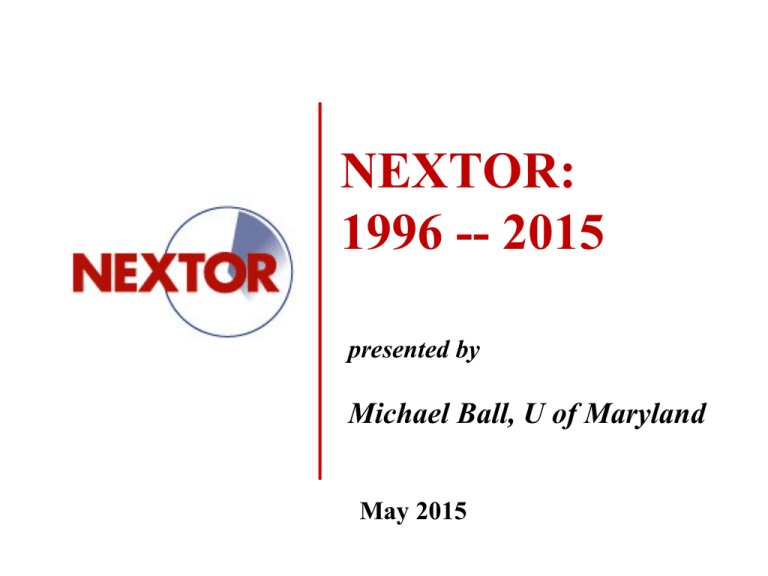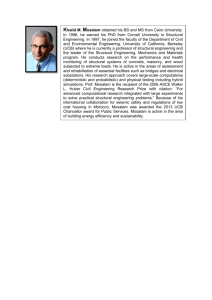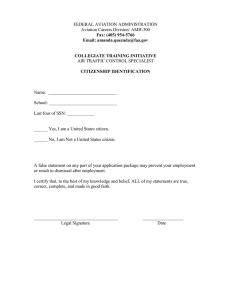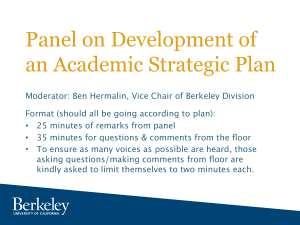NEXTOR: 1996 -- 2015 Michael Ball, U of Maryland
advertisement

NEXTOR: 1996 -- 2015 presented by Michael Ball, U of Maryland May 2015 Agenda • • • • • NEXTOR vision and strategic goals History Major research programs and accomplishments Seminars and workshops Graduates 2 NEXTOR Vision and Strategic Goals • Vision: To be leaders within the aviation community by advancing new ideas and paradigms for aviation operations, promoting knowledge exchange among industry, government, and academic leaders, and educating and training aviation professionals. • Strategic Goals – Continue to build on our strong base of collaborative research and innovative thinking that will address critical needs in the National Airspace System – Conduct frequent conferences and seminars among senior leadership of the aviation industry, government, and academia – Increase the breadth of aviation operations research knowledge through short courses and degree programs at each of the NEXTOR Universities 3 History • Founded in 1996 as FAA Center of Excellence after competitive bid process • Initially 4 core universities (Maryland, MIT, UC Berkeley, Virginia Tech); industry partners; affiliate universities • George Mason added as fifth core university in 2002 • Georgia Tech, The Ohio State University and Purdue added to team that won the competitive solicitation for NEXTOR II in May, 2011 • No “guaranteed” funding – program offices across the FAA have funded a wide range of specific projects • Over the years, industry partners have joined in projects and funded various projects; substantial recent funding from NASA 4 The Team: Faculty Operations Research: Ball (UMD), Barnett (MIT), Barnhart (MIT), Beloboba (MIT), Bertsimas (MIT), Bodin (UMD), Chen (GMU), Hoffman (GMU), Johnson (GT), Landry (PUR), Odoni (MIT), Shen (UCB), Sherali (VT), Shortle (GMU), Smith (OSU), Uhan (PUR),Yano (UCB) Transportation Engineering: Austin (UMD), Bayen (UCB), Donohue (GMU), Horvath (UCB), Lovell (UMD), Mishalani (OSU), Murray-Tuite (VT), Rakas (UCB), Schonfeld (UMD), ), Sengupta (UCB), Sherry (GMU), Trani (VT), Walker (UCB, Young (OSU) Aeronautical Engineering: Balakrishnan (MIT), Clarke (GT), Crossley (PUR), DeLaurentis (PUR), Feigh (GT), Feron (GT), Hansman (MIT), Hwang (PUR), Marais (PUR), Mavris (GT), Pritchett (GT), Sun (PUR), Waitz (GT) Transportation Economics: Dresner (UMD), Hansen (UCB), Kanafani (UCB), Windle (UMD) Electrical Engineering: Shastry (UCB), Tassiulas (UMD), Tomlin (UCB). Economics: Ausubel (UMD), Cramton (UMD), Peterson (VT) 5 Industry Collaborators Industry Partners and Industry Collaborators: American Airlines, ATAC Corp, Avidyne, Boeing, The Brattle Group, Crowne Consulting, CSSI, Delta, Federal Express, Gellman Research Associates (GRA), Honeywell, Intelligent Automation, Inc. (IAI), LMI, Massport, Maryland Aviation, Metron Aviation, The Port Authority of NY&NJ, Raytheon, Saab/Sensis Corp., Southwest Airlines. Affiliate Universities: Dartmouth College, Embry Riddle, San Jose State University, University of Colorado, University of Pennsylvania, University of South Florida, University of Texas at Austin. 6 Major Research Areas • • • • • Air Traffic Flow Management Economics and Policy Safety Metrics and Data Analysis Benefits Analysis 7 Early Impactful Projects 8 Collaborative Decision Making and ATFM (all schools, Metron Aviation) • Continuous funding in this area since NEXTOR inception; NEXTOR membership in TFM Research Board • Working with FAA and others to enhance air space and airfield utilization through information sharing and distributed decisionmaking • Developed several methods for planning and controlling ground delay programs, including: • Decision making in context of weather uncertainty • Resource rationing methods and evaluation • Working with industry partner Metron Aviation, several research results have been incorporated into FAA decision support tools • Ground breaking research on quantifying equity and defining equity metrics 9 Positive Passenger Baggage Matching (MIT, UCB) • Investigated economic and operational impact of the implementation a “positive bag-matching security measure” on U.S. domestic flights. • Results used by Congressional committee to approve the domestic PPBM • Research showed that PPBM would not significantly increase delays for domestic carriers 10 Total Delay Impact (all schools, Brattle Group) • Comprehensive, scientific analysis of cost of delay to society • Includes application of extensive NEXTOR research on passenger delays, estimation of impact of capacity constraints on airline scheduling behavior, new models of macro-economic effects as well as other innovations 11 Passenger Delays (GMU, MIT, UMD) • Pioneering analysis demonstrated substantial differences between flight delay statistics and delays experienced by passengers • Defined passenger delay metrics • Regularly compute/update statistics on passenger delays (also maintain public web site) 12 Airport Congestion Management (GMU, MIT, UCB, UMD, Harvard, GRA) • Examined several different administrative and market mechanisms for controlling congestion at LaGuardia airport • Held two strategic simulations involving government decision makers, airline planners and airport operators – these examined various congestion management mechanisms including administrative procedures, congestion pricing and slot auctions • Generated toolbox for government policy makers that allows selection of a set of components put together in such a way to achieve policy goals • NEXTOR research supported multiple FAA/DOT Proposed Rulemakings, including technical appendices that provided specific certain fair allocation procedures • NEXTOR supported NY Area Rule-making Committee 13 Fatality Risk of Air Travel (MIT) • Define appropriate metric of fatality risk of air travel • Perform periodic update of metric values • Compare metric across countries, continents, etc. • Results and analysis used to estimate impact of various FAA programs, to understand variation in safety risk across regions and to estimate benefits of proposed projects, programs and technologies 14 Some Recent Projects 15 ADS-B Roll Out (MIT, VT, Purdue, Avidyne) • Determine which ADS-B applications have the most value to different user groups to incentivize ADS-B equipment decisions • Develop high value Traffic Situation Awareness with Alerting Application • Cost benefit analysis of ADS-B use for oceanic traffic 16 Comparison of U.S. and European Air Space Systems (MIT, UCB, UMD, GT) • Comparing two systems relative to delay, throughput and other dimensions • Relating performance differences to differences in slot control policies, TFM approaches and weather/climate 17 NextGen TFM (all schools) Several recent NASA-funded projects have addressed TFM in NextGen context: • Dynamic, stochastic Models for Managing Air Traffic Flows (MIT, UCB, UMD, VT, Metron Aviation) • Advanced Stochastic Network Queuing Models of the Impact of 4D Trajectory Precision (MIT, UCB, UMD, IAI) • Analysis of Gaming in NextGen TFM (GMU, Sensis, GRA) • Congestion Management for Airspace (GMU) • Modeling Environmental Factors in Surface Trajectory Operations (MEFISTO) (GMU) • Integration of Advanced Concepts and Vehicles into the Next Generation Air Transportation System (UCB, UMD, Raytheon, IAI) FAA Project: Best Equipped / Best Served (MIT, UCB, UMD, GRA) • Developed new ground delay program resource allocation methods for cases where equipped aircraft provide throughput increase 18 Wake Vortex Modeling (GMU, MIT, VT) • Analyze and evaluate of wake separation concepts. • Evaluate existing wake models and development new simulations as appropriate. • Model effects of wake re-catorization and estimate potential benefit pool. • Develop understanding of how wake vortex challenges and mitigation techniques are coupled with other elements of NextGen system. 19 Others To be discussed today: – Update on flight risk analysis – Integrated Safety Assessment Model – ADS-B for Oceanic Use: Operational Analysis and CostBenefits Assessment – Predictability Analysis and New Metrics – Passenger Delay Modeling – Service Level Expectation Setting for Air Traffic Management – Analysis of Gaming Issues in Collaborative Trajectory Options Program On-Going Projects: – NATSIM model development – Air Connectivity Index – Cost of Delay to Air Cargo Operations – Analysis of Lightning-Induced NAS Outages and Impact on NAS Performance – Impact of Oil Prices on Aviation System Performance – CNS Availability and NAS Performance: Beyond ControllerPilot Datalink Communications 20 Seminars, Workshops and Short Courses 21 Economics and Aviation Policy Workshops June, 2007: Allocation and Exchange of Airport Access Rights • The Aspen Institute, Wye River Conference Center, Queenstown, MD June, 2004 Government, the Airline Industry and the Flying Public: a New Way of Doing Business • The Aspen Institute, Wye River Conference Center, Queenstown, MD March, 2002: National Airspace System Resource Allocation: Economics and Equity • The Aspen Institute, Wye River Conference Center, Queenstown, MD March, 2001: Airline and National Strategies for Dealing with Airport and Airspace Congestion • The Inn and Conference Center, University of Maryland 22 National Airspace System Performance Workshops • Periodic workshops held at Asilomar Conference Center in Pacific Grove CA • Bring together FAA executives and analysts and industry and university researchers • Presentations cover – FAA priorities and challenges – NAS performance trends and problem areas – application of recent research to explaining and solving NAS performance problems • Five workshops held: – February, 2015 – April, 2009 – September, 2007 – March, 2006 – January, 2004 23 Other Workshops and Short Courses • Several other workshops were held on infrastructure management and air traffic management. • Several short courses have been held on a variety of topics, including air transportation systems analysis, infrastructure management, equity and fairness in air traffic management and optimization models for ait traffic managements. • An airport planning short course is held each year at UC Berkeley. 24 NEXTOR Students 25 … Perhaps the greatest legacy of NEXTOR is not the impact of its research projects but rather the large cadre of students it has trained who are quickly becoming the next generation of thought leaders in air transportation… • The vast majority of former NEXTOR students have been trained by working closely with NEXTOR faculty on a broach range of research projects • Over its 19 year history, the NEXTOR universities, have awarded more than 104 PhD degrees and 138 masters degrees to students involved in NEXTOR research projects! 26 PhD Alumni have taken faculty positions at several prestigious universities: … Stanford, Harvard, Georgia Tech, U. of Colorado, Purdue, U. of Arizona, South Florida, U of Pennsylvania, Embry Riddle, U of Tennessee, U of Texas, U of Alberta, San Jose State, Spelman College, Air Force Institute of Technology, Korea Adv Inst of Sci and Tech, National Chiao Tung U., Dartmouth College, U of Illinois-Chicago, Carnegie Mellon, Iowa State, Ohio State, Korea Aerospace University, Missouri U of Sci and Tech… 27 Employers of NEXTOR PhD and masters alumni span the entire range of the aviation community: – Several students have gone to work for the FAA!! – Airlines, including: American*, Continental, United, Air France, British Airways, Fed Ex, UPS, Emirates, Citation – Consultants and Aviation Research, including: Metron Aviation*, Saab Sensis*, CSSI*, Crowe Consulting, Mitre*, AvMet*, Mosaic ATM*, Parsons Engineering, Landrum and Brown*, Leigh Fisher*, Ricondo*, Sabre*, Lincoln Labs*, Raytheon, Lockheed Martin, Jacobs, Booz-Allen* – Other government including NASA*, DOD*, Eurocontrol – Manufacturers including Boeing Commercial, Airbus * multiple placements 28 We and our former students look forward to the next 19+ years! 29


